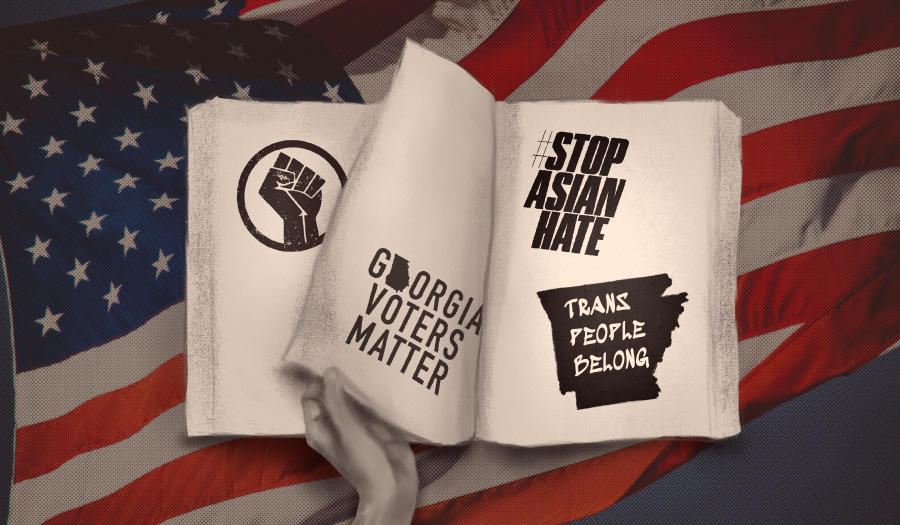To keep the powerful accountable, we must link individual issues to a systemic problem.
Asian hate? Overlooked. Black lives? Overlooked. Workers’ rights? Overlooked. While each movement cements its place in our textbooks, the powerful seem to be hurriedly flipping to the next page. They avoid action. They avoid resolutions. Before a chapter ends with justice, a new tragic plot is opened. Even President Biden, the highest political official in the U.S., stayed silent on the issue of gun violence until it became a recurring topic of conversation, until mass shootings took the lives of more than 100 people this year alone. Relentless assaults on human rights have plagued our nation in recent years. But change has yet to show itself on the horizon of hope. Citing the need to combat new issues, many politicians have learned to ignore enduring problems. From public opinion to legislative proposals, the pace of progress has been stalled to the point of inaction. The disconnect between the system that constantly berates “WE THE PEOPLE,” and the single issue-centric wrath that we have grown to harbor has only empowered the true oppressors.
When the public was ready to pressure lawmakers to address Georgia’s voting restrictions, Arkansas rolled-out a transphobic attack on healthcare for transgender youth. As Black Lives Matter worked to focus efforts on the trial of Derek Chauvin and on justice for George Floyd, a new BIPOC movement required action, namely, Stop Asian Hate.
While all of these are noble causes, their relevance relies heavily on media virality. When these movements are reduced to trending hashtags, politicians use the spotlight to issue sappy remarks without enacting actual change. Politicians should not be allowed to reduce their ‘voice’ to quotes and pictures among other emblems of performative activism, especially when their job descriptions call on them to act rather than perform. They rely on the constant change of what is viral to stay complacent. But in reality, actions against people based on socioeconomic class, gender identity/sexual orientation, race, and religion are all connected by threads of apathy and bigotry. Using these common threads, we can advocate for systemic change rather than letting our messages be dictated by novelty.
We start by encouraging greater comradery between groups by educating each other on how oppressive policy has affected each of us personally. In the civil rights era, the Jewish-Black alliance was strengthened by a bond of empathy that accompanied their mutual understanding of anti-Semitism and color racism. In fact, many Jews flooded to support Black causes after domestic terrorism against their own institutions in the 1950s — such as the 1958 bombing of The Temple in Atlanta. Without diminishing the struggles that each group faced, Jewish and Black-Americans were able to focus their attention on the connections between supremacist ideologies. One does not need to compare institutions of slavery to those of the Holocaust to draw attention to oppression. Comparing the economic and racial implications that led to these events is enough. We must learn from their examples as well as fight for justice in various realms with similar root causes. Hate has evoked fear among Black and Asian communities. These incidents stem from brutal rhetoric and scapegoating. Every life bears equal importance. Every life vanquished is equally tragic. Once race is assumed to be a criminal, another is assumed to be a virus, yet the root cause for these groups’ plight is obvious: white supremacy … not each other. Instead of trying to steal a temporary spotlight from another movement, targeting this source of fear must take precedence.
Between laws targeting Black voters and Deep South businesses suppressing primarily white workers’ efforts to unionize, there is a connection of blocking access to fair representation. Between the oppression towards Muslims and Black-Americans, there is a connection via the preconceived notions of criminality. Between blaming a woman for being raped and stripping healthcare for trans youth, we can spot a criminal level of disregard for mental and physical health. As these connections are made between every single movement of the past, present and future, a clear picture of the flawed legislative priorities can be brought into the spotlight. Rather than fighting on many fronts and trying to bring attention to a plethora of issues that inevitably compete with each other for relevance, we can shift our attention to the few nodes that couple the adversity that each community faces together.
With active efforts to highlight our commonalities, we can also potentially eliminate the stratifications that currently separate us from participating in each other’s fights. Rather than diverting attention from qualms that have yet to be addressed, each new issue must compound to increasingly highlighted systemic flaws. Rather than being limited to the “fifteen minutes of fame” that accompanies tragic or shocking events, our influence can be felt forever.
Our political and economic overlords trust the impermanence of public memory, driven by ignorance, to allow widespread inaction. But our fights are all connected. It is time to use the loom of unity and understanding to weave the threads connecting our struggles. Only this fabric of solidarity between individual causes can smother a system that continues to suffocate its people.
Art by Angela Liang for the UC San Diego Guardian.
















